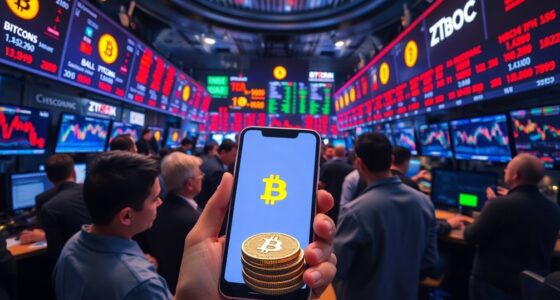You might be surprised to learn how the ASPIRe Initiative is transforming Hong Kong into a powerhouse for crypto innovation. By fostering collaboration among blockchain firms and aligning with regulatory frameworks, it's creating an environment ripe for virtual asset development. This strategic approach could change the landscape of digital finance. But what does this mean for local and international investors looking to navigate this evolving market?

As Hong Kong embraces the digital revolution, its approach to crypto innovation is striking a balance between fostering technological advancement and ensuring financial stability. The city's regulatory framework is a key component of this balance, particularly in how it manages stablecoins and Virtual Asset Trading Platforms (VATPs). By focusing on regulating fiat-backed stablecoins, you'll find that Hong Kong aims to enhance financial stability while simultaneously supporting decentralized innovation.
Hong Kong strikes a balance between crypto innovation and financial stability through robust regulation of stablecoins and VATPs.
The expansion of VATP licensing further strengthens this framework, allowing for a more structured environment where crypto activities can flourish under the oversight of the Securities and Futures Commission (SFC). In fact, the SFC granted the third VATP license to HKVAX, emphasizing the importance of a secure and regulated digital asset trading environment.
You might be interested to know that Hong Kong has made significant strides in crypto adoption as well. By recognizing Bitcoin and Ethereum as proof of assets for investment immigration, it marks a crucial step toward broader acceptance. The city experienced remarkable year-over-year growth in crypto adoption, with a staggering 85.6% increase, positioning itself as a leader in Eastern Asia.
Unlike mainland China, which has a more restrictive legal framework, you'll see that Hong Kong's unique approach fosters an environment where institutions can drive crypto adoption, thanks in part to its favorable regulations.
The Hong Kong Monetary Authority (HKMA) is also making waves with its digital currency initiatives. The e-HKD pilot program is exploring tokenized deposits and potential Central Bank Digital Currency (CBDC) applications. The launch of a fiat-referenced stablecoin sandbox reflects the city's commitment to fostering innovation in this space.
Additionally, staking opportunities are becoming available, further integrating digital assets into the financial ecosystem.
Hong Kong's emphasis on Web3 and blockchain development is another exciting aspect. Through hubs like Cyberport, the city supports over 270 blockchain firms, nurturing a generation of experts in this field.
As platforms like The Sandbox recognize Hong Kong as a strategic location for metaverse development, the convergence of AI and blockchain is also gaining traction, paving the way for new financial applications.
With the support of InvestHK and various tax incentives, businesses are finding it easier to navigate the local regulatory landscape.
All these factors combined position Hong Kong at the forefront of crypto innovation, making it a vibrant hub for those looking to explore the future of finance in the digital age.











